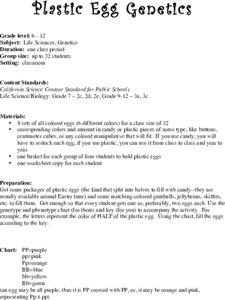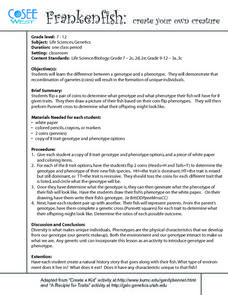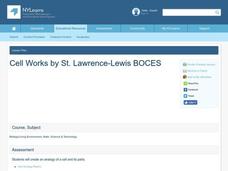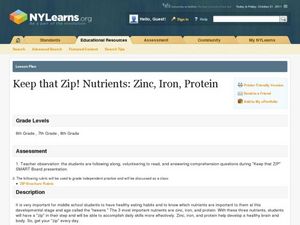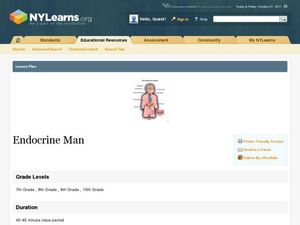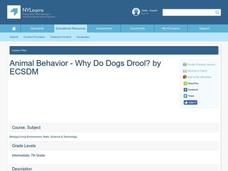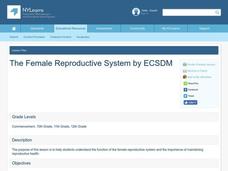Curated OER
Snowy Owl Adaptations
Students explore the adaptations that are made by the snowy owl. They discuss why these adaptations are necessary and how they protect the owl. Students create a snowy owl puppet.
Curated OER
Introduction To Seasons
The purpose of this lesson is to introduce the pupils to a unit on seasons. The Students will learn how to navigate a PowerPoint presentation. They will use the PowerPoint presentation to take a pre test in order to determine the prior...
Curated OER
What Proof is There to Support Biological evolution?
Students identify who developed the theory of evolution. The concepts of adaptation and development are discussed. The age of the earth is explored in relationship to the development of various species. The condition of the environment...
Curated OER
Plastic Egg Genetics
Students are introduced to the concepts of genetic dominance, recessiveness, related terms, Punnett Squares, etc.
Curated OER
Frankenfish
Learners learn the difference between a genotype and a phenotype. They demonstrate that recombination of gametes (coins) will result in the formation of unique individuals.
Curated OER
Toothpick Fish
Young scholars experiment with genes and environment for a population of "Toothpick Fish."
Curated OER
Plants
Third graders study the factors necessary for plant growth and how plants adapt to their environment. They examine ow different plants require different environments to thrive.
Curated OER
Be the Kiwi: What is going on in New Zealand?
Students study the three environmental issues facing New Zealand today. In this ecology lesson, students brainstorm some solutions to these environmental issues. They share what they have written in their journals.
Curated OER
Terrariums for Project Pals
Students identify the components needed by plants to survive in the terrarium. In this biology lesson, students build their own terrariums using materials available. They present their project in class.
Curated OER
It's Alive! Or is it?
Students differentiate the characteristics of living and nonliving things. In this life science lesson, students compare and contrast robots and living things. Given an object, they decide whether it's is living or not and defend their...
Curated OER
Cycles Review
Eighth graders discuss the four major cycles of matter. For this general science lesson, 8th graders decide which of the four is the most important. They share their opinion in class.
Curated OER
Who Wants to be a Cellular Biologist?
Eighth graders review concepts in cellular biology. In this biology lesson, 8th graders play an interactive game based on the idea of winning money. They discuss misconceptions about the topic.
Curated OER
Introduction to Biomes
Eighth graders identify the different kinds of biomes. In this life science instructional activity, 8th graders explain their importance in an ecosystem. They take a BrainPop quiz at the end of the instructional activity..
Curated OER
Ecology: Adaptations
Eighth graders identify different types of adaptation in organisms. In this biology lesson, 8th graders explain how adaptation help organisms survive. They complete a worksheet at the end of the lesson.
Curated OER
Photosynthesis and Respiration
Eighth graders differentiate photosynthesis and respiration. In this biology instructional activity, 8th graders draw a diagram explaining these two processes. They answer a quiz after the instructional activity.
Curated OER
Introduction to Scientific Illustration
Seventh graders draw scientific illustrations in the lab. In this life science lesson plan, 7th graders discuss the importance of drawing in science experiments. They differentiate scientific drawing from basic art.
Curated OER
Characteristics of Living Things
Seventh graders identify the characteristics of living and non-living things. In this biology lesson, 7th graders define vocabulary words as they go through the lesson. They answer a crossword puzzle after class discussion.
Curated OER
Cell Works
Young scholars identify the different parts of the cells and their functions. In this biology lesson plan, students create an analogy of a cell and its organelles. They make a poster and present it to class.
Curated OER
Keep that Zip! Nutrients: Zinc, Iron, Protein
Students explain the importance of zinc, iron and protein. In this biology lesson, students create a brochure containing information about the three nutrients. They share their brochure in class.
Curated OER
Endocrine Man
Students identify the parts and function of the endocrine system. In this biology lesson, students draw a man and label the glands of the endocrine system. They present their poster in class.
Curated OER
Animal Behavior - Why Do Dogs Drool?
Seventh graders give examples of learned behaviors. In this life science lesson plan, 7th graders simulate a behavior conditioning experiment. They complete an assessment at the end of the lesson plan.
Curated OER
The Miracle Fish: Learning to Design an Experiment
Middle schoolers investigate the behavior of a miracle fish. In this life science lesson plan, students write a procedure about the fish experiment. They collect data, construct graphs and draw conclusion at the end of the lab.
Curated OER
Cow's Eye Dissection
Pupils identify the parts and function of the different parts of the eye. In this anatomy lesson, students simulate dissection using Exploratorium website. They watch a video and write the procedure of cow's eye dissection.
Curated OER
The Female Reproductive System
Students identify the different parts of the female reproductive system. In this health science lesson, students explain the functions of each part. They research Female Reproductive Health Issue and share their findings in class.





